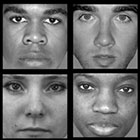 Researchers at Harvard University have found a region of the brain where neural patterns changed when test subjects viewed either a Black or White face. The researchers used real-time scans of the brain during testing where facial images of African Americans and White Americans were shown to test subjects.
Researchers at Harvard University have found a region of the brain where neural patterns changed when test subjects viewed either a Black or White face. The researchers used real-time scans of the brain during testing where facial images of African Americans and White Americans were shown to test subjects.
Manual Contreras, the lead author of the study who recently earned a Ph.D. at Harvard, states, “We found that a region called the fusiform face area seems to play a key role in differentiating faces. When we studied the patterns of activation in the region, we found they were different for Black and White faces.”
Similar differences in brain activity were found when tests subjects were shown facial images of men and women.
The authors speculate that in evolutionary terms, individuals who could more quickly determine the gender or race of the person they came in contact with, had a better chance of survival. “Sex and race can be important things to know about another person,” Dr. Contreras said. “So it would make sense that as soon as you see another person, you need to figure out the social categories to which they belong.”
The article may be viewed here.










